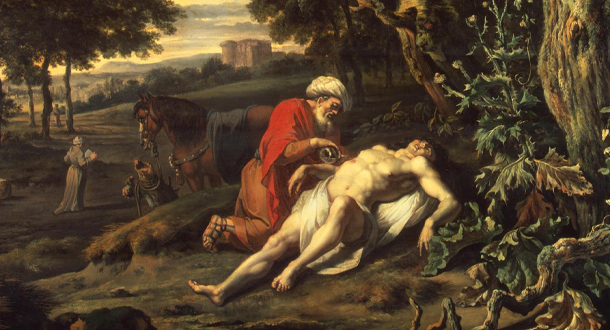
Scripture:
Deuteronomy 30:10-14
Colossians 1:15-20
Luke 10:25-37
Reflection:
The parable of the Good Samaritan is so familiar to most of us that it can sometimes be a challenge to find new insight within the story. Once again, we read that Jesus is “tested” by a scholar of the law attempting to catch him out. It feels like the same old scenario where Jesus’ words (and authority) are seen as a threat to those who hold a strict interpretation of the law. Jesus masterfully uses this parable—only found in Luke—to demonstrate who our neighbor is and what the law requires.
Not content with Jesus’ response, “Do this and you will live” further attempting to “justify himself,” he asks, “And who is my neighbor?” This scholar seems to understand the neighbor as the people of Israel alone. The first part of Leviticus 19:18 begins with, “You shall not take vengeance or bear a grudge against any of your people” and continues, “but you shall love your neighbor as yourself,” perhaps giving insight to the scholar’s understanding. There is no justification for this scholar, rather Jesus’ interpretation expands and broadens the scope of the law. In this instance, his parable demonstrating a (hated) Samaritan as being the one who shows compassion is insulting to the scholar.
Theologian Karl Barth has said that we should hold our Bible in one hand and the newspaper in the other, read both, and interpret the newspaper through the Bible. In light of recent events, I cannot help but associate the man who fell into the hands of robbers and lies beaten and half dead with many situations of suffering. Six months ago, we had the devastating fires in California. Living in the Eaton fire area, we know so many who are still displaced, beaten down by all the tasks of rebuilding their lives. The obstacles are enormous, and the recent immigration raids have only added to the fear and economic hardships of an already suffering community. Additionally, the unspeakable horrors of the floods in Texas, claiming too many lives, amplifies the suffering. Those beaten and broken—our neighbors—need many “good Samaritans.”
Evoking the prophet Isaiah’s words, “You will indeed look but not perceive, for this people’s heart has grown dull” (Is. 6:10), the priest and the Levite looked and kept going restrained by strict purity and societal laws. Yet, Jesus tells us above all to see and act to care for our wounded. Love of God and love of neighbor is our lens—always. St. Paul tells us in Colossians that he is the firstborn of all creation, the image of the invisible God, from whom everything flows. Made in his image and likeness, we press on in hope. While current events can be overwhelming, we are an Easter people, and alleluia must ultimately be our song.
Deuteronomy offers us the hopeful assurance that when we turn to the Lord, our God, with all our heart and soul, we will succeed in carrying out the work of building the kingdom one act at a time. Theologian Dolores Williams writes that God makes a way out of no way. Refreshed and nourished by this truth, our hearts will never grow dull.
May we live out the words that our psalm instructs, turn to the Lord in our need, and we will live. Amen
Jean Bowler is a retreatant at Mater Dolorosa Passionist Retreat Center in Sierra Madre, California, and a member of the Office of Mission Effectiveness Board of Holy Cross Province.
